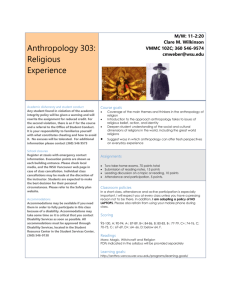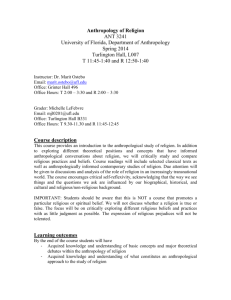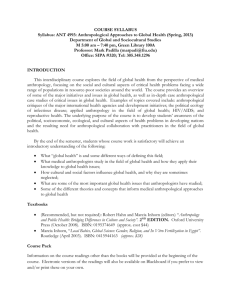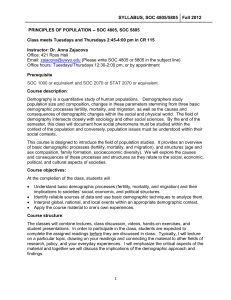Thursday: Video-TBA Friday: Lecture and Discussion
advertisement
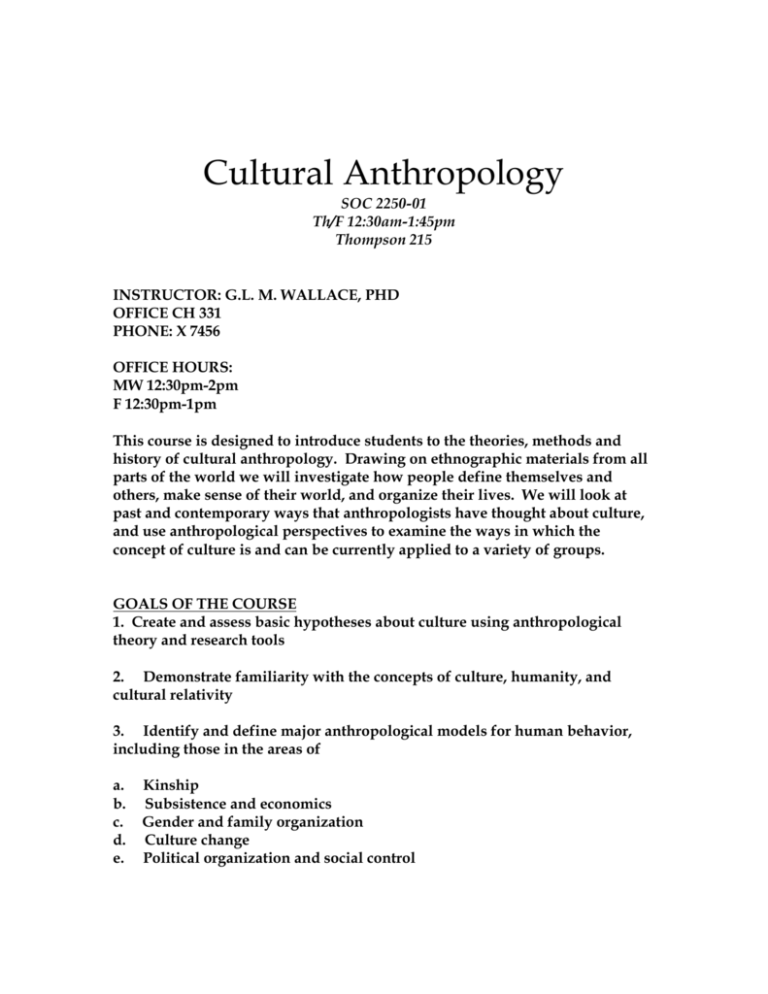
Cultural Anthropology SOC 2250-01 Th/F 12:30am-1:45pm Thompson 215 INSTRUCTOR: G.L. M. WALLACE, PHD OFFICE CH 331 PHONE: X 7456 OFFICE HOURS: MW 12:30pm-2pm F 12:30pm-1pm This course is designed to introduce students to the theories, methods and history of cultural anthropology. Drawing on ethnographic materials from all parts of the world we will investigate how people define themselves and others, make sense of their world, and organize their lives. We will look at past and contemporary ways that anthropologists have thought about culture, and use anthropological perspectives to examine the ways in which the concept of culture is and can be currently applied to a variety of groups. GOALS OF THE COURSE 1. Create and assess basic hypotheses about culture using anthropological theory and research tools 2. Demonstrate familiarity with the concepts of culture, humanity, and cultural relativity 3. Identify and define major anthropological models for human behavior, including those in the areas of a. b. c. d. e. Kinship Subsistence and economics Gender and family organization Culture change Political organization and social control 4. Apply anthropological theories to ethnographic data in order to interpret relations between cultural and/or natural variables impacting human society through the preparation of appropriate hands-on projects, such as... a. b. Collecting information through direct observation of human interactions Participant observation studies 5. Recognize and evaluate cross-cultural, international, and global outlooks 6. Recognize ethnocentrism in themselves and others Course Requirements I. Attendance- Students are expected to attend all scheduled sections. Missing three or more class sessions will result in the loss of a letter grade (subsequent absences will require an additional loss of grade). II. Assignments- (a) Ethnographic Assignments: (40% of final grade). Students will be required to conduct up to 4 different ethnographic research assignments. (b) Exams: There will be four multiple choice/true false exams given over the course of the semester. Each exam will address ideas and concepts from the course. (40% of final grade). Please note: III. All submitted writing must be typed (1.5-2.0 spacing) and contain a bibliography of works cited. IV. Participation- Everyone is expected to have read the course readings before coming to lecture section. Do not come to class without being prepared, as it will reflect negatively on your final grade. You will never be required to know everything. You are, however, expected to be willing to engage everything. An important part of your participation grade will consist of your being able to make a significant contribution to the class through your ability to add to the discussion of course materials. Students will also be asked to produce a number (at least 5) of short (1-2pg) analyses that will also contribute to your participation grade. NOTE: You will also be expected to be able to speak in a detailed and authoritative manner (in class) on the papers that you write in class (20% of Final Grade). NOTE: IF YOU ARE STUDENT WITH A DOCUMENTED DISABILITY, SPEAK TO ME REGARDING ANY ACCOMODATIONS THAT CAN BE MADE. The grade distribution for individual assignments is as follows: A+ [ 95-100 ] C+ [ 75-79 ] A [ 90-95 ] C [ 70-74 ] B+ [ 85-89 ] D [ 60-69 ] B [ 80-84 ] F [ 0-59 ] TOTAL POINTS FOR THE COURSE: 1000 A=1000-900 POINTS B=899-800 POINTS C=799-700 D=699-600 F=599-0 Course Readings-IN THE BOOKSTORE: * TITLE:Cultural Anthropology * AUTHOR:Barbara Miller * EDITION:6th * COPYRIGHT YEAR:2012 * PUBLISHER:Allyn & Bacon, Incorporated * ISBN:9780205035182 * NEW:$147.25 * USED:$110.50 * RENTAL:$71.78 Additional Readings will be made available at no additional charge, on the course website ADDITIONAL NOTES 1. EMAILING: EVERY EMAIL IS VIEWED AS AN AGREEMENT TO MEET WITH ME DURING OFFICE HOURS. IF YOU HAVE QUESTIONS, COMMENTARY OR SUGGESTIONS THAT WARRANT AN EMAIL, YOU MUST COME AND SEE ME DURING OFFICE HOURS. WHY IS THIS AN ISSUE? SOME STUDENTS USE EMAIL TO AVOID CONTACT WITH THEIR INSTRUCTORS. I WANT TO SEE YOU AND TO BE ABLE TO DISCUSS YOUR QUESTIONS IN-PERSON AND IN-DEPTH. I FEEL SO STRONGLY ABOUT THIS THAT I COUNT OFFICE VISITS AS EXTRA CREDITSUPPLEMENTING YOUR PARTICIPATION GRADE. 2. MAKE-UP QUIZZES: THERE WILL BE NO MAKE-UP QUIZZES. 3. COMPUTER/CELL PHONE USAGE: IF YOU ARE USING YOUR COMPUTER FOR ANY ACTIVITY THAT IS NOT DIRECTLY RELATED TO COURSE WORK (IF YOU ARE SURFING THE NET OR SENDING TEXT MESSAGES), YOU WILL FORFEIT YOUR PARTICIPATION GRADE. 4. CHANGES TO SYLLABUS: YOUR SYLLABUS IS A GUIDE AND IS NOT “ETCHED IN STONE”. THERE MAY BE TIMES IN WHICH IT MAY BE NECESSARY TO ADJUST OUR SCHEDULE BASED ON A VARIETY OF FACTORS. WHEN THIS OCCURS, THE ALTERATION WILL BE NOTED VERBALLY IN CLASS AND INCLUDED IN THE ONLINE VERSION OF OUR SYLLABUS. Schedule of Readings and Assignments Week 1 Jan. 20, 21 Introductions, Review of Syllabus: Why Are You Here? Week 2 Jan. 27, 28 WHAT IS ANTHROPOLOGY? ANTHROPOLOGY AND THE STUDY OF CULTURE Readings- Chapter 1; Of Headhunters and Soldiers: Separating Cultural and Ethical Relativism (found on the website) Thursday: Lecture & Discussion- Anthropology as a humanist philosophy /Fields of Anthropological Inquiry Friday- Lecture & Discussion- Anthropology as a humanist philosophy /Fields of Anthropological Inquiry Week 3 Feb. 3, 4 THE EVOLUTION OF HUMANITY AND CULTURE Readings: Chapter 2 Thursday: Lecture & Discussion-Evolution and Culture Friday: Video-TBA Week 4 Feb. 10, 11 RESEARCHING CULTURE Readings: Chapter 3; Geertz article Thursday: Lecture and Discussion-Culture Friday: EXAM #1 Week 5 Feb. 17, 18 MAKING A LIVING Readings: Chapter 4, Sahlins article (website) Thursday: Video-TBA Friday: Lecture and Discussion-Making a Living Week 6 Feb. 24, 25 CONSUMPTION AND EXCHANGE Readings: Chapter 5 Thursday : Video-TBA Friday: Lecture and Discussion-Consumption and Exchange Week 7 Mar. 3, 4 REPRODUCTION AND HUMAN DEVELOPMENT Readings: Chapter 6 Thursday: Lecture and Discussion-Reproduction and Human Development Friday: Lecture and Discussion-Reproduction and Human Development Week 8 Mar. 10, 11 DISEASE, ILLNESS AND HEALING Readings: Chapter 7; Scheper-Hughes article (website) Thursday: Lecture and Discussion-Disease, Illness and Healing Friday: EXAM # 2 Week 9 Mar. 17, 18 SPRING BREAK Week 10 Mar. 24, 25 KINSHIP AND DOMESTIC LIFE/ SOCIAL GROUPS AND SOCIAL STRATIFICATION Readings: Chapters 8 & 9 Thursday: Video-TBA Friday: Lecture and Discussion-Kinship/Stratification Week 11 Mar. 31, Apr. 1 POLITICAL AND LEGAL SYSTEMS Readings: Chapter 10 Thursday: Video-TBA Friday: Lecture and Discussion-Political and Legal Systems Week 12 Apr. 7, 8 COMMUNICATION Readings: Chapter 11 Thursday: EXAM #3 Friday: Lecture and Discussion –Communication Styles Week 13 Apr. 14, 15 RELIGION Readings: Chapter 12, Marvin Harris article (website) Thursday: Video-TBA Friday: Lecture and Discussion-Religion Week 14 Apr. 21, 22 EXPRESSIVE CULTURE/ PEOPLE ON THE MOVE Readings: Chapter 12, Maira (website), Nassy Brown (website) Thursday: Video Friday: Lecture and Discussion-Art and Immigration Week 15 Apr. 28, 29 PEOPLE DEFINING DEVELOPMENT Readings: Chapter 15, Escobar (website) Thursday: Video-TBA Friday: Lecture and Discussion-What is Development? Week 16 May 5, 6 PRESENTATIONS/QUIZ Thursday: Presentations Friday: EXAM #4 Academic Integrity Policy Excerpted from the FSC Online Catalog (http://www.fsc.edu/catalog/Policies/) “Every member of the College community is expected to maintain the highest standards of academic integrity. A student shall not submit work that is falsified or is not the result of the student's own effort. A student who is in doubt regarding standards of academic integrity in a course or assignment should consult the faculty member responsible for that course or assignment before submitting the work. A student's lack of understanding of the academic integrity policy is not a valid defense to a charge of academic dishonesty. A student's name on any written or creative exercise (e.g., examination, report, thesis, theme, laboratory report, computer program, artistic production, etc.), or in association with an oral presentation, declares that the work is the result of that student's own thought and study. Any work that the student declares as his or her own shall be stated in the student's own words and produced without the assistance of others. Students must make clear through accurate citations when they make use of other sources. Talking during an examination, or possession or use of unauthorized materials or equipment during an examination constitutes an infringement of the academic integrity policy. Aiding and abetting academic dishonesty also constitutes a violation of the academic integrity policy. Unless permission is received in advance from the faculty member in charge of the course involved, a student may not submit, in identical or similar form, work for one course that has been used to fulfill any academic requirement in another course at Fitchburg State College or any other institution. A student who perceives the possibility of overlapping assignments in courses should consult with the appropriate faculty members before presuming that a single effort will fulfill requirements of both courses. Students should consult course syllabi for additional guidance on matters of academic integrity.”


